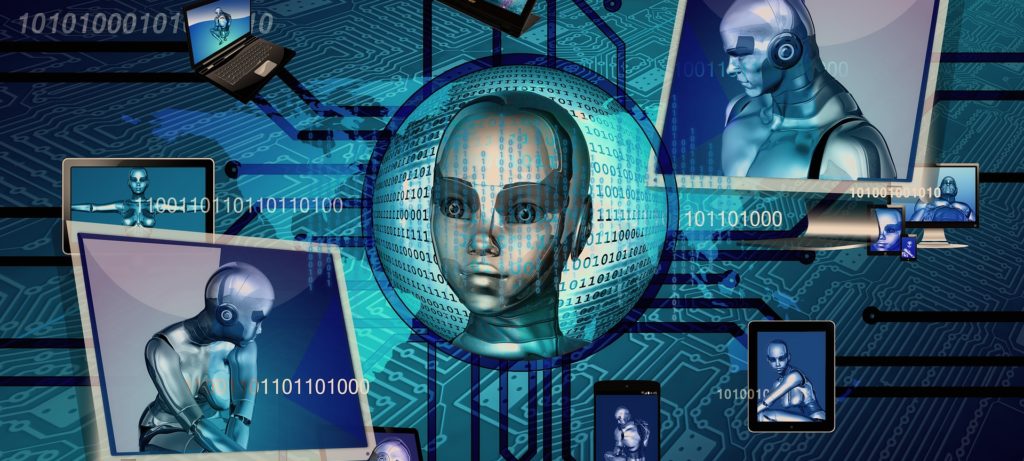You are a Cyborg

I am willing to bet that 95% of you reading this have your smartphone within arm’s reach or in your hand at this very moment. Only 10 years ago, hardly anyone owned a smartphone, and today, 2.3 billion people have one or more of these multi-functional handheld devices. And we don’t only own them; we are so connected to our smartphones in so many ways that some might say we have functionally merged with them, deeply integrating them into our identities, careers and social lives.
Our smartphones are always near, at our side or under our fingertips, a silent life companion, closer to us than any family member, friend or romantic partner is or could be. We carry them to the supermarket, to school, to the bathroom, we sleep beside them, eat with them and even shower while they wait patiently on the sink for us to finish. The only other thing we have pressed against our bodies for so much of our daily lives is our underwear (and even that, on hot summer nights, may be further away from some people than their smartphone). Smartphones are so close and so intertwined with our thought processes, memories, plans, and secrets, that it’s like they have become a part of us.
The Rise of Smartphones
Never in the history of mankind has there been such an immensely useful personal tool. The smartphone is Internet, telephone, television, radio, music collection, video arcade, drive-through window, bank, newspaper, magazine, alarm clock, calendar, daily planner, shopping center, and much more all in one pocket-sized device. Because of its speed, size, countless apps and web access, it has something to offer everybody. It has therefore transcended culture, age, and sex and has become globally popular in only a matter of a few years, remolding much of how the world works in the process.
Smartphone culture has influenced our expectations of professional performance and social behavior. Since it is assumed that everyone has access to everything at all times, previously existing restrictions such as space and time have now been erased. It doesn’t matter if you’re not at your office computer anymore; your boss knows you receive his emails on your phone and he expects a prompt response. It doesn’t matter that you’re eating out with your family tonight; your friend knows that your phone is in your pocket and he wants you to advise him on what to text his crush back after she sent him a winking emoji. In this day and age, we can’t distance ourselves from the assumption of constant availability; the boundaries between work and home, private and public, busy and free have been blurred, and with that blurring of lines the concept of a new type of human has emerged as well.
Cyborgs
“Cyborg – An organism, often a human, that has certain physiological processes enhanced or controlled by mechanical or electronic devices, especially when they are integrated with the nervous system.”
– American Heritage® Dictionary of the English Language
The study of cybernetics that originated in the 1940s proposed that a man and machine that work together form one system; they are part of the same functional entity with the tool simply being an extension of the user. A person using scissors to cut a square out of a piece of paper would do the task as effectively as the morbidly charming Edward Scissorhands would with his physically attached scissors-for-hands. What makes Edward functionally different from a person simply holding the tool? Nothing. Physical melding between parts is not required if the objective is nevertheless accomplished by the hand-tool hybrid. Using that same logic to view the smartphone phenomenon, we can say that although the smartphone is not implanted into our brain like would be the case with a classic cyborg design, it nevertheless makes us all cyborgs in the sense that it is a nearly ever-present extension of our minds and senses (and sometimes even our arms, legs, and mouths, depending on what we need it to do).
Numerous questions arise in this new age of cyborgs about where man’s own cognitive capabilities fit into the expanding landscape of intelligent technology. Why do we need to learn when the first World War began or who built the Empire State building or how a car engine works if all we have to do is type the question into Google to get an instant answer or video tutorial? Why do we have to learn how to calculate equations manually when we have a calculator permanently at our fingertips? Why enhance our skills in ___ area when there’s an app for that (because there’s an app for everything)? If we can upload memories to files and clouds, download answers to almost any question at the click of a button, and export daily tasks to a variety of automatic applications, what is there left for our minds to do?
Some may consider this a dangerous move for society, a reason to criticize a population that is growing intellectually lazier and a reason to fear the growing power of machines. But perhaps, on the other hand, the expansion of the online world and the opportunities it brings is actually creating a wider variety of niches for both people and machines to find a place in. Traditional professions such as teaching, engineering, and medicine among others will always be around, and the professionals who do them will always need to be aptly educated and qualified. However, the growing influence of computers and the Internet has created numerous new professions such as computer scientists, data analysts, website builders, programmers, etc. And for those who steer away from traditional professions because they have been seduced by the entertainers that dominate their device screens, careers like YouTuber, Instagram model, graphic designer, and social media marketer are just a few of the new digital age careers that have exploded in popularity in the last few years.
(And let’s not forget that in any career, being knowledgeable and experienced, well-read and quick-thinking will only help one to be more successful and have a leg up on the competition. So although it can seem like it at times, thinking is not yet out of style.)
The Internet and Society
For those that value traditional education and the importance of storing knowledge within their own memory banks instead of relying on an external mechanism to provide it, there will be numerous opportunities. And for others who prefer to embrace their cyborg-selves and merge with the online mind, using its cognitive capabilities instead of their own to think, create and remember, there will be numerous other career and product consumption opportunities in the virtual world for them that didn’t exist just a few years ago, just as this mindset didn’t exist back then either. Changing times means changing consumers and changing demands. The Internet has become like another fully-formed world, a society of virtual shops and cinemas and schools parallel to ours, that needs its own complete workforce, thereby opening a literal world of new opportunities.
The optimistic vision of a cyborg is to maintain a human essence while expanding our physical and mental powers beyond human limits. Whether it is morally right to do so is a question of religion, and whether it will truly improve the human experience is a question of time and intent. But the fact remains that simply Googling something and integrating the result of the search into our thought processes has become such a natural and seamless behavior, that it’s like the internet is simply an externalized neuronal network of our own brains. In essence, the barrier between us and the machine’s mind is just a thin screen that hovers inches from our faces almost 24 hours a day, 7 days a week. We desire and require machines in order to function at our best in the modern world. Therefore we have become, not in form but in function, true 21st century cyborgs.


Recent Comments